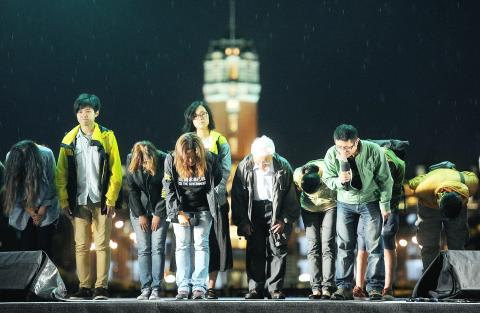Former Democratic Progressive Party (DPP) chairman Lin I-hsiung (林義雄) yesterday afternoon announced the end of his hunger strike against the continued construction of the Fourth Nuclear Power Plant and said he was grateful for the “phenomenal antinuclear effort” of Taiwanese over the past two weeks.
Lin said he would continue to fight what he called the injustice of President Ma Ying-jeou’s (馬英九) administration.
“The struggle of the millions of Taiwanese over the past two weeks has been unprecedented, touching and admirable. As a response to the people’s sincere caring, I have decided to end my hunger strike and vow to spend the rest of my life working with Taiwanese to safeguard Taiwan’s democracy and sovereignty,” Lin said in a press release posted on his Web site at about 2:30pm.

Photo: Fang Pin-chao, Taipei Times
Lin remains at National Taiwan University Hospital after being admitted to the hospital on Monday afternoon for examinations. He is reported to be in stable condition.
There has been no word on when he might return to his home in Yilan to recuperate.
The 73-year-old announced plans for a hunger strike on April 15 in an effort to promote a nuclear-free homeland and the termination of the power plant in New Taipei City’s Gongliao District (貢寮). He began his fast on April 22, vowing not to end the fast until Ma announced a halt to the construction of the plant.
Lin’s crusade has prompted several large-scale antinuclear protests. Police have come under harsh criticism for allegedly resorting to excessive violence and water cannons to evict crowds from the protest sites.
The Ma administration on Sunday announced it would halt construction at the Gongliao plant.
Lin and other antinuclear advocates have said they are not satisfied with the government’s response, accusing Ma of “playing with words” and being insincere with the proposed shutdown because it leaves room for resuming construction and evading legislative supervision.
However, Lin yesterday said the antinuclear campaign has reached its preliminary goal of stopping the construction.
What Taiwanese must do next is to prevent Ma from jeopardizing Taiwan’s democracy and selling out the nation’s sovereignty, Lin said.
He said the president always takes the opposite view of mainstream public opinion.
Taiwanese “have now been awakened,” and with determination and courage, there will be “unstoppable people’s power” against an authoritarian national leader, Lin said.
He said Taiwanese should work to develop trust, solidarity and enhance their capabilities before turning to new goals, including the passage of an amendment to the Referendum Act (公民投票法), blocking passage of a special statute on free economic pilot zones, promoting an amendment to the Constitution by organizing a citizens constitutional conference and demanding a pledge on a nuclear-free homeland from all the candidates in the seven-in-one elections scheduled for November.
DPP Chairman Su Tseng-chang (蘇貞昌), former DPP chairperson Tsai Ing-wen (蔡英文) and Taiwan Solidarity Union Chairman Huang Kun-huei (黃昆輝) all said they were relieved to learn Lin had ended his hunger strike and expressed their appreciation for Lin’s devotion to the cause.
Su said the DPP would focus on amending the Referendum Act, as passing a special statute on the Fourth Nuclear Power Plant would no longer be necessary.
Huang said his party’s focus would be a special statute governing the free economic pilot zones and a constitutional conference.
The National Nuclear Abolition Action Platform, which began a rally on Ketagalan Boulevard in Taipei on Saturday in support of Lin, said yesterday evening that it would leave the boulevard at 9pm, but the group will monitor the government’s pledge to halt work on the plant.
Green Citizens’ Action Alliance secretary-general Tsuei Su-hsin (崔愫欣) said they will also continue to demand that the lifespan of the three operating plants not be extended, that a cross-party monitoring committee be established to ensure construction work at the fourth plant ends and the Referendum Act be amended.
Although the protest on Ketagalan has ended, the social movements for abolishing nuclear power will continue, and the groups condemn state violence against non-violent public protests, she said.
Meanwhile, Lin’s announcement drew many positive responses in online forums and on Facebook, with many netizens praising his decision and wishing him well.
Additional reporting by Lee I-chia

NO-LIMITS PARTNERSHIP: ‘The bottom line’ is that if the US were to have a conflict with China or Russia it would likely open up a second front with the other, a US senator said Beijing and Moscow could cooperate in a conflict over Taiwan, the top US intelligence chief told the US Senate this week. “We see China and Russia, for the first time, exercising together in relation to Taiwan and recognizing that this is a place where China definitely wants Russia to be working with them, and we see no reason why they wouldn’t,” US Director of National Intelligence Avril Haines told a US Senate Committee on Armed Services hearing on Thursday. US Senator Mike Rounds asked Haines about such a potential scenario. He also asked US Defense Intelligence Agency Director Lieutenant General Jeffrey Kruse

INSPIRING: Taiwan has been a model in the Asia-Pacific region with its democratic transition, free and fair elections and open society, the vice president-elect said Taiwan can play a leadership role in the Asia-Pacific region, vice president-elect Hsiao Bi-khim (蕭美琴) told a forum in Taipei yesterday, highlighting the nation’s resilience in the face of geopolitical challenges. “Not only can Taiwan help, but Taiwan can lead ... not only can Taiwan play a leadership role, but Taiwan’s leadership is important to the world,” Hsiao told the annual forum hosted by the Center for Asia-Pacific Resilience and Innovation think tank. Hsiao thanked Taiwan’s international friends for their long-term support, citing the example of US President Joe Biden last month signing into law a bill to provide aid to Taiwan,

China’s intrusive and territorial claims in the Indo-Pacific region are “illegal, coercive, aggressive and deceptive,” new US Indo-Pacific Commander Admiral Samuel Paparo said on Friday, adding that he would continue working with allies and partners to keep the area free and open. Paparo made the remarks at a change-of-command ceremony at Joint Base Pearl Harbor-Hickam in Hawaii, where he took over the command from Admiral John Aquilino. “Our world faces a complex problem set in the troubling actions of the People’s Republic of China [PRC] and its rapid buildup of forces. We must be ready to answer the PRC’s increasingly intrusive and

STATE OF THE NATION: The legislature should invite the president to deliver an address every year, the TPP said, adding that Lai should also have to answer legislators’ questions The Chinese Nationalist Party (KMT) yesterday proposed inviting president-elect William Lai (賴清德) to make a historic first state of the nation address at the legislature following his inauguration on May 20. Lai is expected to face many domestic and international challenges, and should clarify his intended policies with the public’s representatives, KMT caucus secretary-general Hung Meng-kai (洪孟楷) said when making the proposal at a meeting of the legislature’s Procedure Committee. The committee voted to add the item to the agenda for Friday, along with another similar proposal put forward by the Taiwan People’s Party (TPP). The invitation is in line with Article 15-2